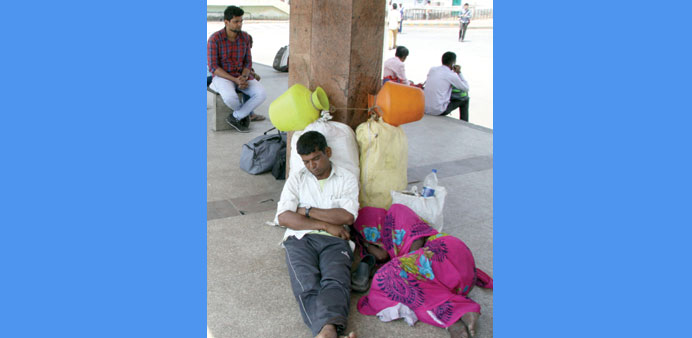Commuters take rest at a bus terminus in Bengaluru as they were unable to travel due to the day-long shutdown yesterday.
IANS/Bengaluru
A 12-hour dawn-to-dusk shutdown, which crippled life in many parts of Karnataka yesterday, ended peacefully.
The shutdown, called by about 70 Kannada organisations and regional parties, in support of building a dam across the Cauvery river at Mekadutu for power and drinking water supply in the old Mysuru region, received a huge response from people in many cities and towns across the state.
“The shutdown was by and large peaceful barring a few incidents of stone-throwing, burning of effigies and blocking of roads and state highways to stop traffic. We also made preventive arrests to maintain law and order,” a senior police official said.
The state government’s plan to build the dam at Mekedatu in Kanakapura, about 100km from Bengaluru, is facing opposition from Tamil Nadu, the southern riparian state, which shares the river water under a tribunal award.
The 800km-long Cauvery river, which originates at Talakaveri near Kodagu in the rich biodiverse Western Ghats region, flows southwards to Tamil Nadu, Puducherry and Kerala and finally joins the Bay of Bengal.
After holding demonstrations and processions across Bengaluru, Mandya, Mysuru and Chamarajanagar in the state’s southern region, a huge rally was held at Freedom Park in the capital city where leaders of Kannada organisations and regional political groups urged the state government to build the dam.
“The chief minister has promised to lead a delegation to the prime minister for central government’s intervention in resolving the issue with Tamil Nadu amicably,” a Kannada Rakshna Vedike (protection group) told reporters after a 30-minute meeting with Chief Minister Siddaramaiah at his residence.
The shutdown brought life to a standstill, with schools, colleges, markets, hotels, malls, petrol stations and cinemas closed in cities and towns across the old Mysore and Malnad regions, though life in the state’s coastal and northern regions remained unaffected.
Though state-run transport corporations did not join the shutdown, buses were not operated in the city and across the old Mysore region. Private buses, maxi-cabs, taxis and auto-rickshaws also kept off roads.
Train and flight services, however, remained unaffected though hundreds of passengers faced hardship to travel from railway stations and the airport in the absence of public or private transport.
Emergency services, hospitals, medical shops, supply of milk, vegetables and essential commodities were exempted from the shutdown.

